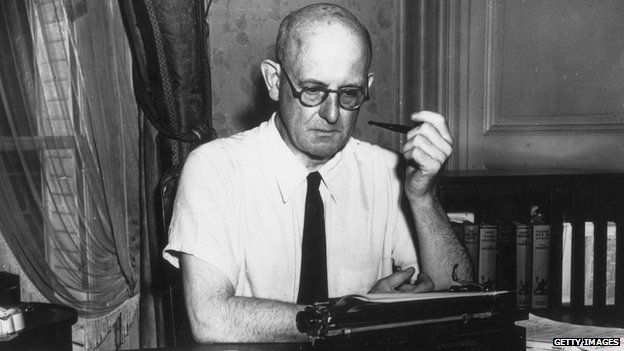PG Wodehouse and his French connection
- Published

Author PG Wodehouse was born in England and died in the US, but in between he lived for several years in France, a country that looms large in some of his most colourful creations.
It is true what they say in the blurb - there honestly is no better antidote to anguish, ennui or general world-weariness than to flick through a few pages of the Master.
I speak from experience. PG Wodehouse has coaxed me out from many a dark place - and now I have become intrigued by a hitherto unexplored sidelight on the life and oeuvre. Really, someone should take it up as an academic thesis - Wodehouse and the French.
Plum - as he was known - began living in France in 1934. He chose Le Touquet, on the north coast, because it was a fashionable resort with golf, casino and a beach for the dogs.
He had visited the country many times before of course, and French places and characters were already featuring regularly in the books.
Cannes, the playground of toffs par excellence, was a favourite. In the story Noblesse Oblige for example, Drones Club member Freddie Widgeon is invited to be the judge in a sea-front "pretty mother-and-baby" competition.
He accedes, understanding that his reward will be a much-needed 500 franc note. Too late does he realise that the 500 francs is what he - an evidently copiously-endowed English milord - is supposed to supply to the winning mother-and-baby. And of course noblesse oblige - so he does.
Cannes also provides the setting for what buffs regard as one of the most perfect opening Wodehouse paragraphs, this from The Luck of the Bodkins:
"Into the face of the young man who sat on the terrace of the Hotel Magnifique... there had crept a look of furtive shame, the shifty hangdog look which announces that an Englishman is about to talk French."
PG Wodehouse always said his own French was rudimentary. But his unfailingly brilliant ear - combined, one supposes, with a solid grounding from school - meant that his renderings on the page were always perfectly hilarious.
Nowhere is this truer than in depictions of his most famous French character, that gift of God to the gastric juices, the temperamental chef Anatole.
In Right Ho, Jeeves, Anatole is described as a tubby little man with a moustache of the outsize or soup-strainer type, which turns up or droops down depending on mood.
With his "Sylphides a la creme d'ecrevisses" or his "Nonnettes de poulet Agnes Sorel", Anatole alone is capable of soothing the chronic indigestion of Tom Travers - businessman husband of Bertie Wooster's favourite aunt Dahlia - and there is much intriguing by various malefactors who try to steal Anatole for their own kitchens.
Anatole's English is fluent but mixed. To add to his inevitable Frenchisms, he also once worked for an American family in Nice, where he studied under their chauffeur, one of the Maloneys of Brooklyn, we are told, and this gives a certain rough colour.
But when fully aroused he reverts to French:
"Words like "marmiton de Domange", "pignouf", "hurluberlu" and "roustisseur" were fluttering from him like bats out of a barn. Lost on me of course [this is Bertie Wooster writing in the first person] because I am still more or less in the "esker-vous-avez" stage. I regretted this, for they sounded good."
Those words do exist, by the way.
Then there is Nicolas Jules St Xavier Auguste, Marquis de Maufringneuse et Valerie-Moberanne, lead rogue in the book French Leave who has a job in a ministry as "employe attache a l'expedition du troisieme bureau" (in other words - clerk).
Or the picturesque Brittany town of St Rocque, site of Chateau Blissac, where in one delicious scene in Hot Water two characters, neither of whom can speak French, are both pretending to be French, and so have to improvise a French-sounding conversation in front of other guests in order to preserve their false credentials.
Poor old Plum's time in France did not end happily. In 1940 he was detained at his home Low Water in Le Touquet by the advancing German army.
Sent to an internment camp, he was released the next year when he turned 60, but he then made his famously ill-judged broadcasts, intended as light-hearted diversions for American fans but of great propaganda value to the Nazis.
Wodehouse came to live in Paris and it was at the Hotel Bristol - down the road from where I write this in the BBC office - that at the Liberation in 1944 he was found and questioned by the journalist Malcolm Muggeridge, then working for MI6.
Wodehouse was detained by the French for a while but he was never charged and in 1947 he left for the United States.
I know he must have loved it in France. They are a minor theme of course, but in his hands, France and the French radiate optimism, gaiety, sheer fun.
Now as ever, now more than ever, balm for the soul.
How to listen to From Our Own Correspondent:
BBC Radio 4: Saturdays at 11:30 and some Thursdays at 11:00.
BBC World Service: Short editions Monday-Friday - see World Service programme schedule.